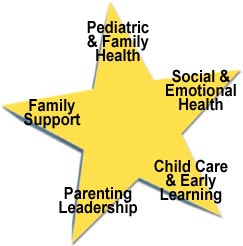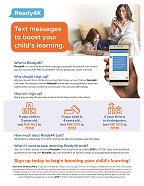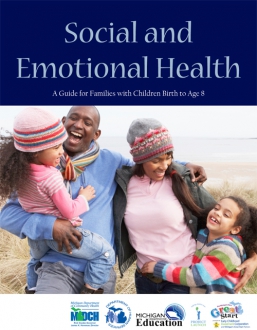

The Clinton County Great Start Collaborative, including the Great Start Family Coalition, is a network of service providers, parents, business and community leaders, and educators who work together to provide coordinated support for families of children from birth through age five. These individuals work together to oversee the planning, implementation, and ongoing improvement of programs and services for Clinton County children and families.
The Great Start Collaborative’s goal is to help ensure that children are safe, healthy and ready to learn when they enter kindergarten in Clinton County. All children deserve a healthy foundation so that they can be successful in school and in life.
Interested in learning more? Feel free to contact Clinton County Great Start Co-Coordinators, Cindy Pline at 989-224-6831 ext. 2153 or Ken Lounds at 989-224-6831 ext. 2132.
These materials were developed under a grant awarded by the Michigan Department of Education.
![]() Follow us on Facebook!
Follow us on Facebook!
The Great Start Family Coalition is made up of parents, grandparents, and caregivers of young children in Clinton County.
Click here for meeting schedule, upcoming events and to join our group.
Play groups are for any child who lives in Clinton County ages 0-5. Planned activities are developmentally and age appropriate. All children must be accompanied by an adult.
For more information and schedule click here.

The early years of a child’s life provide the physical and emotional framework that shapes individual potential. During the early years a child's development is rapid and extensive. Experiences in these years establish intelligence, behavioral patterns, and other personality traits that will persist throughout a lifetime.
These experiences take place in the context of family and community life molded by economic and social conditions.
The Great Start System recognizes that early childhood experiences are most profound in Five Key Areas:

The concept is simple, the rewards are priceless. Read a book to your newborn, infant, and/or toddler. The goal is to have read 1,000 books (yes you can repeat books) before your precious one starts kindergarten.
Reading to preschool-aged children builds vocabulary, language, and helps prepare them with the skills they need for Kindergarten. In as little as 15-20 minutes a day, families can prepare their little ones for future school and life success!
For more information click here.

Did You Know…. if a child reads for 20 minutes every day, they are exposed to about 1.8 MILLION words of text every year!
Click below to access the Literacy Tip Sheet for Parents.

Ready4K is a research-based text-messaging program for parents. Each week, you will receive FUN FACTS and EASY TIPS to boost your child’s learning.
A number of factors before and after the birth of a child can create challenges to their development and school readiness. Before the birth of a child, the developing brain architecture of a fetus can be disrupted by poor maternal nutrition, exposure to a variety of hazardous substances and the adverse physiological effects of a pregnant woman’s chronic stress.
Access to prenatal health care can help identify such high-risk circumstances and provide a vehicle for addressing hazards to healthy brain development in a preventive fashion. After birth, providing access to a regular and affordable source of primary health care for mothers, infants and children is important in helping to prevent threats to the child’s healthy development, as well as provide early detection and intervention for concerns that could lead to more serious problems later in a child’s physical, developmental and mental health.

A growing body of evidence shows that emotional development begins early in life and is a critical aspect of the development of a child’s overall brain architecture, with enormous consequences over the course of a lifetime. A child’s emotional well-being and social competence provide a strong foundation for emerging cognitive abilities, and together they are the bricks and mortar that comprise the foundation of human development.
From birth, children rapidly develop their abilities to experience and express different emotions as well as their capacity to cope with and manage a variety of feelings. The development of these capabilities occurs at the same time as a wide range of highly visible skills in mobility (motor control), thinking (cognition), and communication (language). Yet, social-emotional development often receives relatively less recognition as a core emerging capacity in the early childhood years. The foundations of social competence developed in the first five years are linked to emotional well-being and affect a child’s later ability to functionally adapt in school and to form successful relationships throughout life.
High quality child care and early education experiences are critical to every young child’s development. Research has clearly demonstrated that children’s early learning experiences determine their foundation for future learning and success. Children who have high quality child care and preschool experiences, including support for health and emotional well-being, are more successful in later school years, are less likely to repeat a grade, are more likely to graduate high school, attend college, and become productive citizens.
All parents need the support of good community systems to help themselves help their children. Across Michigan, parents of young children lack easy access to information and resources that will help them be their child’s first and most important teacher.
Parenting Leadership in the Great Start System is a continuum of services and supports ranging from parent education for parents in the critical role they play in the healthy development of their infants and other young children, to parents as leaders who advocate for their own children as well as the needs of other young children.
Economic hardship and other types of deprivation (child neglect or abuse) can have profound effects on children’s development and their prospects for the future. Low family income can impact children’s cognitive development and ability to learn. It can contribute to behavioral, social and emotional problems. The greatest risk is for young children who experience economic hardship, especially that of a severe and chronic nature.
Family Support initiatives help parents develop and use available resources that enable them to nurture and support the healthy development of their children. Family support services range from providing information about early learning, to helping families to access economic security benefits and connect with other families and community services.